
Drift R/C Car: The Ultimate Guide for Speed & Style
If you’ve ever dreamed of sliding sideways around corners like a pro drifter, a drift R/C car is your ticket to that adrenaline rush—without the hefty repair bill. These miniature drifting machines capture all the style, precision, and skill of full-sized drift cars, but in a fun, accessible package that anyone can enjoy.
Whether you’re new to R/C cars or a seasoned hobbyist, mastering the art of drifting will take your driving game to a whole new level.
What is a Drift R/C Car?
A drift R/C car is a remote-controlled vehicle designed specifically for drifting—sliding through turns while maintaining control and style. Unlike regular R/C cars, these are built with:
-
Hard plastic tires for less grip, making sliding easier.
-
Special suspension setups for stability during drifts.
-
Rear-wheel drive (RWD) or all-wheel drive (AWD) systems depending on the driver’s preference.
If you’ve tried drifting a regular R/C car with grippy rubber tires, you know it’s not the same. Drift cars are tuned to make sliding feel smooth, controlled, and satisfying.
Types of Drift R/C Cars
1. Electric-Powered Drift Cars
-
Best for beginners due to low maintenance.
-
Powered by rechargeable LiPo or NiMH batteries.
-
Quiet and clean—perfect for indoor drifting.
2. Nitro-Powered Drift Cars
-
More realistic sound and feel thanks to the small combustion engine.
-
Higher speed potential but requires more maintenance.
-
Best for experienced hobbyists.
3. AWD vs. RWD
-
AWD: Easier to control, great for beginners.
-
RWD: More realistic drifting style, preferred by pros.
Choosing the Right Drift R/C Car
When buying a drift R/C car, consider:
-
Scale Size – 1/10 scale is most common and offers the best balance between performance and availability of parts.
-
Budget – Good beginner drift cars start around $150, while high-end competition models can exceed $500.
-
Upgradability – Look for models with plenty of aftermarket parts for future upgrades.
-
Durability – Drifting involves bumps and crashes; strong chassis and suspension are essential.
Tips for Mastering Drift R/C Car Skills
-
Start Slow – Practice on a smooth surface before hitting the drift track.
-
Throttle Control – Drifting is all about balance—too much throttle and you’ll spin out, too little and you’ll lose the slide.
-
Use Cones or Markers – Create a small drift course in your driveway or garage.
-
Upgrade Tires – Harder plastic tires make drifting smoother and more consistent.
-
Adjust Suspension – Softer front suspension and stiffer rear suspension improve control.
Popular Drift R/C Car Brands
-
Tamiya – Known for reliable, beginner-friendly drift kits.
-
HPI Racing – Offers competition-ready models.
-
Yokomo – A favorite in professional drift competitions.
-
MST (Max Speed Technology) – Great handling and build quality.
Drift R/C Car Maintenance
To keep your car performing at its best:
-
Clean after every run to avoid dirt build-up.
-
Check for loose screws or damaged parts.
-
Keep batteries stored safely and charged properly.
-
Lubricate moving parts periodically.
FAQs About Drift R/C Cars
Q1: Can I convert a regular R/C car into a drift car?
Yes, by swapping to hard plastic drift tires and adjusting suspension settings.
Q2: Is AWD or RWD better for drifting?
AWD is easier for beginners, while RWD feels more realistic for advanced drifters.
Q3: Can I drift on carpet?
Yes, but plastic tires are recommended for smooth sliding without damaging the surface.
Q4: How fast do drift R/C cars go?
Most range from 15 to 30 mph, depending on the motor and power source.
Q5: Do I need a special track?
Not necessarily—any smooth, open space can work for practice.
Read also: Best Guide to Car Oil 0W-30: Specs, Uses & Benefits
Final Thoughts
A drift R/C car is more than just a toy—it’s a skill-based hobby that combines precision, style, and speed. Whether you’re setting up a mini track at home or competing with friends, the thrill of sliding perfectly through a corner is addictive.